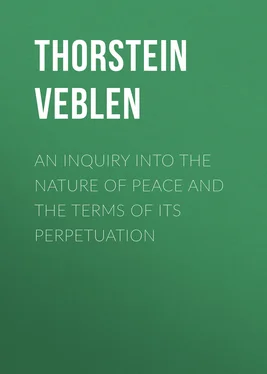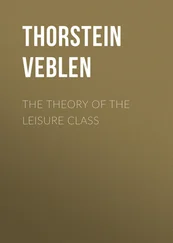Thorstein Veblen - An Inquiry into the Nature of Peace and the Terms of Its Perpetuation
Здесь есть возможность читать онлайн «Thorstein Veblen - An Inquiry into the Nature of Peace and the Terms of Its Perpetuation» — ознакомительный отрывок электронной книги совершенно бесплатно, а после прочтения отрывка купить полную версию. В некоторых случаях можно слушать аудио, скачать через торрент в формате fb2 и присутствует краткое содержание. Жанр: foreign_antique, Политика, Юриспруденция, foreign_edu, на английском языке. Описание произведения, (предисловие) а так же отзывы посетителей доступны на портале библиотеки ЛибКат.
- Название:An Inquiry into the Nature of Peace and the Terms of Its Perpetuation
- Автор:
- Жанр:
- Год:неизвестен
- ISBN:нет данных
- Рейтинг книги:5 / 5. Голосов: 1
-
Избранное:Добавить в избранное
- Отзывы:
-
Ваша оценка:
- 100
- 1
- 2
- 3
- 4
- 5
An Inquiry into the Nature of Peace and the Terms of Its Perpetuation: краткое содержание, описание и аннотация
Предлагаем к чтению аннотацию, описание, краткое содержание или предисловие (зависит от того, что написал сам автор книги «An Inquiry into the Nature of Peace and the Terms of Its Perpetuation»). Если вы не нашли необходимую информацию о книге — напишите в комментариях, мы постараемся отыскать её.
An Inquiry into the Nature of Peace and the Terms of Its Perpetuation — читать онлайн ознакомительный отрывок
Ниже представлен текст книги, разбитый по страницам. Система сохранения места последней прочитанной страницы, позволяет с удобством читать онлайн бесплатно книгу «An Inquiry into the Nature of Peace and the Terms of Its Perpetuation», без необходимости каждый раз заново искать на чём Вы остановились. Поставьте закладку, и сможете в любой момент перейти на страницу, на которой закончили чтение.
Интервал:
Закладка:
Gradually it came true, with the continued advance in those industrial arts that lend themselves to strategic uses, and it came also to be realised, that no corner of the earth was any longer secure by mere favor of distance and natural difficulty, from eventual aggression at the hands of any provident and adventurous assailant,—even by help of a modicum of defensive precaution. The fear of aggression then came definitively to take the place of international good-will and became the chief motive in public policy, so fast and so far as the state of the industrial arts continued to incline the balance of advantage to the side of the aggressor. All of which served greatly to strengthen the hands of those statesmen who, by interest or temperament, were inclined to imperialistic enterprise. Since that period all armament has conventionally been accounted defensive, and all statesmen have professed that the common defense is their chief concern. Professedly all armament has been designed to keep the peace; so much of a shadow of the peaceable bias there still stands over.
Throughout this latest phase of modern civilisation the avowed fear of aggression has served as apology, possibly as provocation in fact, to national armaments; and throughout the same period any analysis of the situation will finally run the chain of fear back to Prussia as the putative or actual, center of disturbance and apprehension. No doubt, Prussian armament has taken the lead and forced the pace among the nations of Christendom; but the Prussian policy, too, has been diligently covered with the same decorous plea of needful provision for the common defense and an unremitting solicitude for international peace,—to which has been added the canny afterthought of the "defensive offense."
It is characteristic of this era of armed peace that in all these extensive preparations for breaking the peace any formal avowal of other than a defensive purpose has at all times been avoided as an insufferable breach of diplomatic decorum. It is likewise characteristic of the same era that armaments have unremittingly been increased, beyond anything previously known; and that all men have known all the while that the inevitable outcome of this avowedly defensive armament must eventually be war on an unprecedented scale and of unexampled ferocity. It would be neither charitable nor otherwise to the point to call attention to the reflection which this state of the case throws on the collective sagacity or the good faith of the statesmen who have had the management of affairs. It is not practicable to imagine how such an outcome as the present could have been brought about by any degree of stupidity or incapacity alone, nor is it easier to find evidence that the utmost sagacity of the statecraft engaged has had the slightest mitigating effect on the evil consummation to which the whole case has been brought. It has long been a commonplace among observers of public events that these professedly defensive warlike preparations have in effect been preparations for breaking the peace; against which, at least ostensibly, a remedy had been sought in the preparation of still heavier armaments, with full realisation that more armament would unfailingly entail a more unsparing and more disastrous war,—which sums up the statecraft of the past half century.
Prussia, and afterwards Prussianised Germany, has come in for the distinction of taking the lead and forcing the pace in this competitive preparation—or "preparedness"—for war in time of peace. That such has been the case appears in good part to be something of a fortuitous circumstance. The season of enterprising force and fraud to which that country owes its induction into the concert of nations is an episode of recent history; so recent, indeed, that the German nation has not yet had time to live it down and let it be forgotten; and the Imperial State is consequently burdened with an irritably uneasy sense of odium and an established reputation for unduly bad faith. From which it has followed, among other things, that the statesmen of the Empire have lived in the expectation of having their unforgotten derelictions brought home, and so have, on the one hand, found themselves unable to credit any pacific intentions professed by the neighboring Powers, while on the other hand they have been unable to gain credence for their own voluble professions of peace and amity. So it has come about that, by a fortuitous conjuncture of scarcely relevant circumstances, Prussia and the Empire have been thrown into the lead in the race of "preparedness" and have been led assiduously to hasten a breach which they could ill afford. It is, to say the least, extremely doubtful if the event would have been substantially different in the absence of that special provocation to competitive preparedness that has been injected into the situation by this German attitude; but the rate of approach to a warlike climax has doubtless been hastened by the anticipatory policy of preparedness which the Prussian dynasty has seen itself constrained to pursue. Eventually, the peculiar circumstances of its case—embarrassment at home and distaste and discredit abroad—have induced the Imperial State to take the line of a defensive offense, to take war by the forelock and retaliate on presumptive enemies for prospective grievances. But in any case, the progressive improvement in transport and communication, as well as in the special technology of warfare, backed by greatly enhanced facilities for indoctrinating the populace with militant nationalism,—these ways and means, working under the hand of patriotic statesmen must in course of the past century have brought the peace of Europe to so precarious a footing as would have provoked a material increase in the equipment for national defense; which would unavoidably have led to competitive armament and an enhanced international distrust and animosity, eventually culminating in hostilities.
It may well be that the plea of defensive preparation advanced by the statesmen, Prussian and others, in apology for competitive armaments is a diplomatic subterfuge,—there are indications that such has commonly been the case; but even if it commonly is visibly disingenuous, the need of making such a plea to cover more sinister designs is itself an evidence that an avowedly predatory enterprise no longer meets with the requisite popular approval. Even if an exception to this rule be admitted in the recent attitude of the German people, it is to be recalled that the exception was allowed to stand only transiently, and that presently the avowal of a predatory design in this case was urgently disclaimed in the face of adversity. Even those who speak most fluently for the necessity of war, and for its merits as a needed discipline in the manly virtues, are constrained by the prevailing sentiment to deprecate its necessity.
Yet it is equally evident that when once a warlike enterprise has been entered upon so far as to commit the nation to hostilities, it will have the cordial support of popular sentiment even if it is patently an aggressive war. Indeed, it is quite a safe generalisation that when hostilities have once been got fairly under way by the interested statesmen, the patriotic sentiment of the nation may confidently be counted on to back the enterprise irrespective of the merits of the quarrel. But even if the national sentiment is in this way to be counted in as an incidental matter of course, it is also to be kept in mind in this connection that any quarrel so entered upon by any nation will forthwith come to have the moral approval of the community. Dissenters will of course be found, sporadically, who do not readily fall in with the prevailing animus; but as a general proposition it will still hold true that any such quarrel forthwith becomes a just quarrel in the eyes of those who have so been committed to it.
Читать дальшеИнтервал:
Закладка:
Похожие книги на «An Inquiry into the Nature of Peace and the Terms of Its Perpetuation»
Представляем Вашему вниманию похожие книги на «An Inquiry into the Nature of Peace and the Terms of Its Perpetuation» списком для выбора. Мы отобрали схожую по названию и смыслу литературу в надежде предоставить читателям больше вариантов отыскать новые, интересные, ещё непрочитанные произведения.
Обсуждение, отзывы о книге «An Inquiry into the Nature of Peace and the Terms of Its Perpetuation» и просто собственные мнения читателей. Оставьте ваши комментарии, напишите, что Вы думаете о произведении, его смысле или главных героях. Укажите что конкретно понравилось, а что нет, и почему Вы так считаете.












